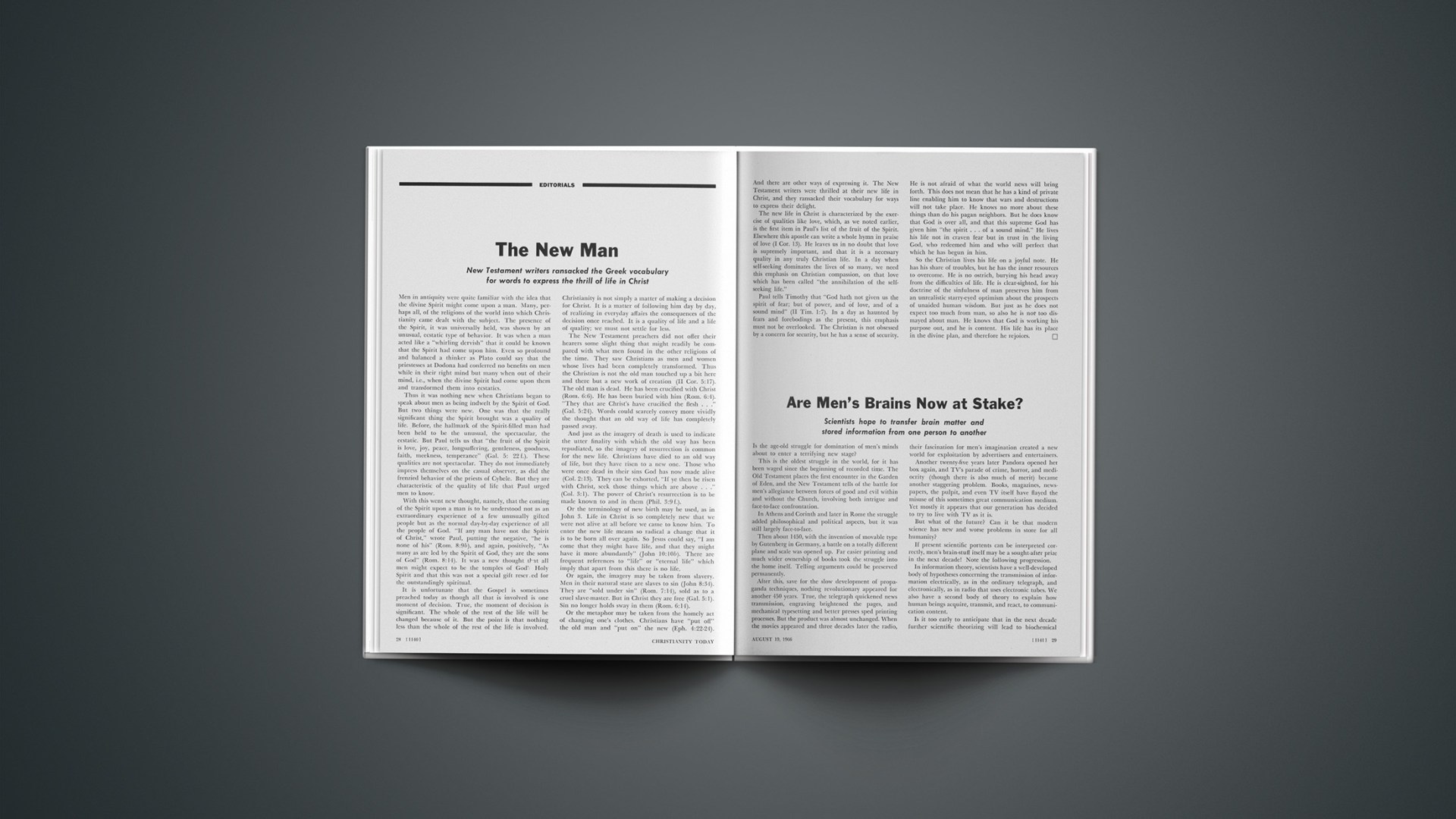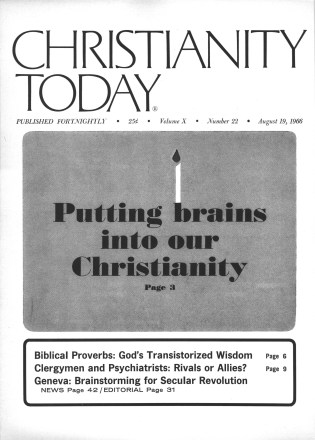New Testament writers ransacked the Greek vocabulary for words to express the thrill of life in Christ
Men in antiquity were quite familiar with the idea that the divine Spirit might come upon a man. Many, perhaps all, of the religions of the world into which Christianity came dealt with the subject. The presence of the Spirit, it was universally held, was shown by an unusual, ecstatic type of behavior. It was when a man acted like a “whirling dervish” that it could be known that the Spirit had come upon him. Even so profound and balanced a thinker as Plato could say that the priestesses at Dodona had conferred no benefits on men while in their right mind but many when out of their mind, i.e., when the divine Spirit had come upon them and transformed them into ecstatics.
Thus it was nothing new when Christians began to speak about men as being indwelt by the Spirit of God. But two things were new. One was that the really significant thing the Spirit brought was a quality of life. Before, the hallmark of the Spirit-filled man had been held to be the unusual, the spectacular, the ecstatic. But Paul tells us that “the fruit of the Spirit is love, joy, peace, longsuffering, gentleness, goodness, faith, meekness, temperance” (Gal. 5: 22 f.). These qualities are not spectacular. They do not immediately impress themselves on the casual observer, as did the frenzied behavior of the priests of Cybele. But they are characteristic of the quality of life that Paul urged men to know.
With this went new thought, namely, that the coming of the Spirit upon a man is to be understood not as an extraordinary experience of a few unusually gifted people but as the normal day-by-day experience of all the people of God. “If any man have not the Spirit of Christ,” wrote Paul, putting the negative, “he is none of his” (Rom. 8:9b), and again, positively, “As many as are led by the Spirit of God, they are the sons of God” (Rom. 8:14). It was a new thought that all men might expect to be the temples of God’s Holy Spirit and that this was not a special gift reserved for the outstandingly spiritual.
It is unfortunate that the Gospel is sometimes preached today as though all that is involved is one moment of decision. True, the moment of decision is significant. The whole of the rest of the life will be changed because of it. But the point is that nothing less than the whole of the rest of the life is involved. Christianity is not simply a matter of making a decision for Christ. It is a matter of following him day by day, of realizing in everyday affairs the consequences of the decision once reached. It is a quality of life and a life of quality; we must not settle for less.
The New Testament preachers did not offer their hearers some slight thing that might readily be compared with what men found in the other religions of the time. They saw Christians as men and women whose lives had been completely transformed. Thus the Christian is not the old man touched up a bit here and there but a new work of creation (2 Cor. 5:17). The old man is dead. He has been crucified with Christ (Rom. 6:6). He has been buried with him (Rom. 6:4). “They that are Christ’s have crucified the flesh …” (Gal. 5:24). Words could scarcely convey more vividly the thought that an old way of life has completely passed away.
And just as the imagery of death is used to indicate the utter finality with which the old way has been repudiated, so the imagery of resurrection is common for the new life. Christians have died to an old way of life, but they have risen to a new one. Those who were once dead in their sins God has now made alive (Col. 2:13). They can be exhorted, “If ye then be risen with Christ, seek those things which are above …” (Col. 3:1). The power of Christ’s resurrection is to be made known to and in them (Phil. 3:9 f.).
Or the terminology of new birth may be used, as in John 3. Life in Christ is so completely new that we were not alive at all before we came to know him. To enter the new life means so radical a change that it is to be born all over again. So Jesus could say, “I am come that they might have life, and that they might have it more abundantly” (John 10:10b). There are frequent references to “life” or “eternal life” which imply that apart from this there is no life.
Or again, the imagery may be taken from slavery. Men in their natural state are slaves to sin (John 8:34). They are “sold under sin” (Rom. 7:14), sold as to a cruel slave-master. But in Christ they are free (Gal. 5:1). Sin no longer holds sway in them (Rom. 6:14).
Or the metaphor may be taken from the homely act of changing one’s clothes. Christians have “put off” the old man and “put on” the new (Eph. 4:22–24). And there are other ways of expressing it. The New Testament writers were thrilled at their new life in Christ, and they ransacked their vocabulary for ways to express their delight.
The new life in Christ is characterized by the exercise of qualities like love, which, as we noted earlier, is the first item in Paul’s list of the fruit of the Spirit. Elsewhere this apostle can write a whole hymn in praise of love (1 Cor. 13). He leaves us in no doubt that love is supremely important, and that it is a necessary quality in any truly Christian life. In a day when self-seeking dominates the lives of so many, we need this emphasis on Christian compassion, on that love which has been called “the annihilation of the self-seeking life.”
Paul tells Timothy that “God hath not given us the spirit of fear; but of power, and of love, and of a sound mind” (2 Tim. 1:7). In a day as haunted by fears and forebodings as the present, this emphasis must not be overlooked. The Christian is not obsessed by a concern for security, but he has a sense of security. He is not afraid of what the world news will bring forth. This does not mean that he has a kind of private line enabling him to know that wars and destructions will not take place. He knows no more about these things than do his pagan neighbors. But he does know that God is over all, and that this supreme God has given him “the spirit … of a sound mind.” He lives his life not in craven fear but in trust in the living God, who redeemed him and who will perfect that which he has begun in him.
So the Christian lives his life on a joyful note. He has his share of troubles, but he has the inner resources to overcome. He is no ostrich, burying his head away from the difficulties of life. He is clear-sighted, for his doctrine of the sinfulness of man preserves him from an unrealistic starry-eyed optimism about the prospects of unaided human wisdom. But just as he does not expect too much from man, so also he is not too dismayed about man. He knows that God is working his purpose out, and he is content. His life has its place in the divine plan, and therefore he rejoices.










